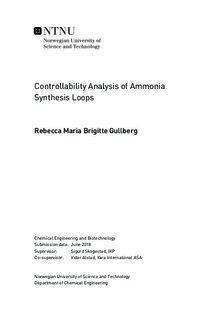Controllability Analysis of Ammonia Synthesis Loops
Abstract
Present ammonia synthesis loops normally operate under stationary conditions. Generally, ammonia synthesis loops can be slow to ramp up and down due to manual mode operation. Furthermore, load disturbances are not rejected efficiently. The aim of this thesis is to study possible control strategies that can increase the flexibility of ammonia synthesis loops with respect to load changes.
A simplified model of the ammonia synthesis loop was developed with CasADi in MATLAB. The model captures the main dynamics associated with load variations. Dynamic open-loop simulations of the model were conducted to analyze when load reduction leads to instability. Instability, in the form of temperature oscillations in the reactor, was visible after a reduction in makeup gas of around 7 % from nominal operation.
Based on a dynamic step-response analysis, several control schemes were proposed. The two main control strategies investigated distinguish between operating the system at an open-loop (1) unstable or (2) stable operating point. Both control strategies are able to handle a load range of 30-100 % of nominal capacity. The first strategy only needs temperature control for stabilization. The latter strategy requires a more complex control scheme, with pressure control in addition to temperature control. The drawbacks associated with a more complex control scheme are considered to be outweighed by the benefits of operating at an open-loop stable operating point.
